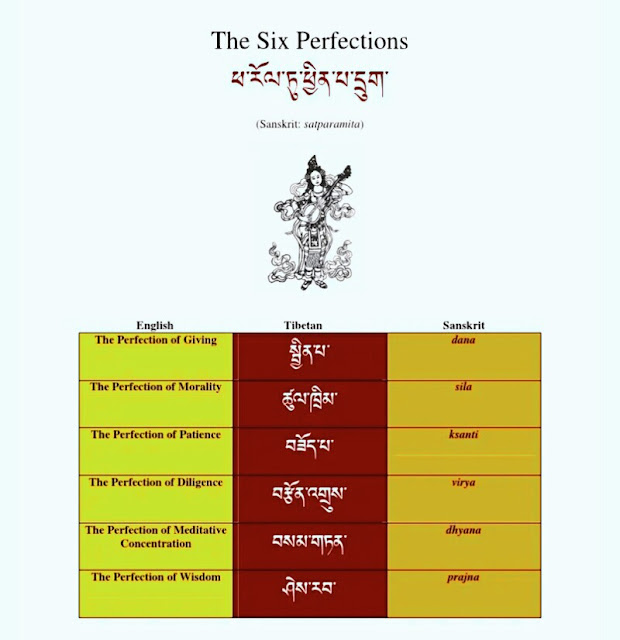- The Bodhicharyavatara teaches the complete Mahayana path to enlightenment, including all necessary preliminary, main, and concluding practices. A perfect path in itself, it is also, at the same time, a perfect support for all practitioners of the Vajrayana teachings in general. Practitioners learn how to develop the motivation of Bodhichitta as well as how to carry out the application of the six paramitas, or transcendental perfections. They learn how to fuse their practice of bodhichitta and the five first perfections with the sixth perfection, wisdom.
Patrul Rinpoche explains that there are two preliminaries to developing meditative concentration.
1. Giving up mundane concerns
As regards renouncing mundane concerns, our mind will never settle into a state of one-pointed absorption as long as it is under the sway of attachment to parents, relatives, and friends or attendants. So we must give up all our habitual preoccupations and busyness and remain alone in an isolated place suitable for meditation.
2. Letting Go of Discursive Thought
Even though we may be in an isolated place, not seeking possessions and such like to any great extent, if our mind falls under the power of desire, a genuine state of meditative concentration will not arise in our being, and our mind will be unable to rest in a state of absorption.
Subdivisions - The Two Types of Dhyana:
- the causal meditative dhyanas
- the resultant Dhyana levels at which one is reborn
The causal meditative dhyanas are the states of meditation that are realised while still here in this world of Jambudvipa. For example, we might reach the meditation of the first or second dhyana. If we can maintain that state of meditation, then when we die, we will be reborn in the corresponding first or second dhyana level of the form realm.
The Three Types of Meditative Concentration
Chökyi Drakpa says:
- "Meditative concentration includes the childish concentration of those who practice isolation away from distractions and busyness but are attached to the experiences of bliss, clarity, and absence of thought. There is also the clearly discerning concentration in which emptiness is clung to as an antidote and the concept-free samadhi of intrinsic reality, which is known as 'the concentration delighting the Tathagatas'. These should be practiced successively, in stages."
The Four Dhyanas - Khenpo Pema Vajra says:
- The first Dhyana level, which is accomplished in this way, has five features: conception, discernment, joy, physical wellbeing, and samadhi.
- The second Dhyana, which is even more peaceful, has four features: the perfect clarity in which conception and discernment have been relinquished; joy; physical wellbeing; and samadhi.
- The third Dhyana, which is more peaceful still, has five features: equanimity, in which the concept of joy has been abandoned; mindfulness; watchful awareness; physical wellbeing; and samadhi.
- The fourth dhyana, which is called the ultimate dhyana because it is yet more peaceful, has four features: the neutral sensation, in which the sensation of physical wellbeing has been abandoned; mindfulness; the mental formation of equanimity; and samadhi.
- Donations for our Buddhist research and developmentDo you earnestly cherish our devoted work? Assuming this is the case, we are delighted that you are finding our blog useful and valuable. Would you consider making a donation for our Buddhist research and development?We need your help to secure the future of scholarly interaction with Buddhism. Since our very first publication of Dharma works and activities in 2008, we have been effortlessly providing free distribution of Dharma posts and articles throughout the previous 14 years. We have exceptionally constrained support and do not receive subsidies or funding from people in general.Please help us develop our Dharma activities that will not only benefit you but all Dharma readers on the planet. Please consider showing your support. Your generosity will certainly help us enhance our work and accomplish more for a better and brighter future.Thank you for reading. May you find peace and great bliss. With your support, it helps to spread the Buddha’s precious teachings and turn the Dharma wheels in the world.Aspiration For BodhichittaFor those in whom the precious Bodhichitta has not arisenMay it arise and not decrease.But increase further and further.Dedication of MeritBy this merit, may we then obtain omniscience then.Having defeated the enemies wrongdoingsMay we liberate migratory from the ocean of existence.With its stormy waves of birth, old age, sickness, and death.*NoteI do not own or infringe any copyright on the picture(s).Picture(s) courtesy and credit to the rightful distributors and/or studiosThe picture(s) are intended for editorial use only.


































